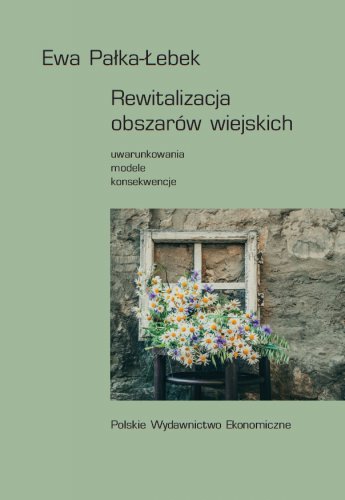Rewitalizacja obszarów wiejskich. Uwarunkowania – modele – konsekwencje
Publication date: 2019
Place publication: Warszawa
Publication: I
Binding: paperback
Format: B5
The book Rural areas revitalization. Prerequisites – models – consequences presents an extensive knowledge about the processes of revitalization taking place in rural areas. The work was done as a response to a deficit of studies concerning this problem area and the context of rural regions. It is also a sort of an answer to currently evolving processes of revitalization in rural aeras, in which opportunities are expected for development of these lands and regions, in particular those that had experienced a profound and serious crisis. The key research problem considered in the study is identification of revitalization as a solution for development or rural areas. The present state of knowledge in this area clearly indicates this is both important and topical issue. Actually, revitalization has been one of the formidable challenges faced by rural areas in Poland. Fortunately, it attracts an increasing interest on the part of experts, territorial authorities, local social groups, NGOs and media.
Apart from its research value, the publication may prove helpful to practitioners who sense the need to extend their knowledge in that area. Then, the study is also addressed to a broad group of stakeholders of revitalization, including territorial authorities, non-governmental organizations, representatives of public institutions, social services, entrepreneurs operating in rural areas and to anybody involved in or intending to undertake activities in the field of revitalization.
Management of waterways company. Case studies ID: 1501516295
The book presents systemic, legal, organizational and sector-specific pre-requisites for the functioning of waterways enterprises. It also describes in much detail the crucial contemporary concepts of management that may be successfully applied in that sector. Another important strength of the book is that it addresses social aspects of functioning of waterways enterprises as well as the issues of measuring their operation effectiveness.
“The monograph is an original, valuable, important and topical publication. It is also probably the first one to cover, on such an extensive scale and scope, the problems of management of waterways enterprises. As the Authors have assumed, the publication is meant to be a scientific study, however enriched with some practical aspects and recommendations which – taken together – should provide a sort of an operating instructions for management staff in waterways enterprises”.
Professor Wojciech Dyduch, PhD
Wstęp
Rozdział 1. ZAŁOŻENIA METODOLOGICZNE PRACY
1.1. Pojęcia podstawowe. Miejsce problematyki rewitalizacji obszarów wiejskich w badaniach naukowych i działaniach praktycznych
1.2. Przedmiot, cele, pytania badawcze, metody, źródła materialne
1.3. Schemat własnych badań
Rozdział 2. PODSTAWY TEORETYCZNE BADAŃ NAD REWITALIZACJĄ OBSZARÓW WIEJSKICH. ZAGRANICZNE I KRAJOWE DOŚWIADCZENIA BADAWCZE
2.1. Geneza i ewolucja badań procesów rewitalizacji obszarów wiejskich oraz procesów pokrewnych
2.2. Procesy rewitalizacji obszarów wiejskich w świetle wybranych koncepcji rozwoju lokalnego i regionalnego
2.3. Uwarunkowania procesów rewitalizacji
2.4. Współczesne tendencje działań rewitalizacyjnych na obszarach wiejskich. Próba uogólnienia doświadczeń
Rozdział 3. PRZEMIANY OBSZARÓW WIEJSKICH W POLSCE JAKO PRZESŁANKI DZIAŁAŃ REWITALIZACYJNYCH
3.1. Zróżnicowanie funkcjonalno-strukturalne obszarów wiejskich i jego konsekwencje
3.2. Problemowość obszarów wiejskich – pojęcie, klasyfikacja rodzajowa i przestrzenna
3.3. Klasyfikacja obszarów wiejskich pod kątem ich rewitalizacji
Rozdział 4. MODELE REWITALIZACJI OBSZARÓW WIEJSKICH A POLITYKA LOKALNA W ŚWIETLE DOŚWIADCZEŃ MIĘDZYNARODOWYCH
4.1. Modele rewitalizacji w krajach zachodnich
4.2. Modele rewitalizacji w innych krajach europejskich
Rozdział 5. ZRÓŻNICOWANIE REWITALIZACJI OBSZARÓW WIEJSKICH W POLSCE – ZAGADNIENIA SZCZEGÓŁOWE
5.1. Kapitał społeczny, finansowe i pozafinansowe instrumenty wsparcia – wybrane zagadnienia w kontekście rewitalizacji
5.2. Zróżnicowanie przestrzenne zaangażowania w procesy rewitalizacji
5.3. Stosunek lokalnej społeczności do procesu rewitalizacji – wyniki badań ankietowych
5.4. Turystyka jako składowa procesu rewitalizacji obszarów wiejskich
5 5. Case study rewitalizacji obszarów wiejskich
Rozdział 6. MODELOWE UJĘCIE REWITALIZACJI OBSZARÓW WIEJSKICH I DZIAŁAŃ POKREWNYCH W POLSCE
PODSUMOWANIE I WNIOSKI
Literatura i materiały źródłowe
Wykaz skrótów
Aneks
| Odbiór osobisty | 0 € |
| Inpost Paczkomaty | 4 € |
| Kurier Inpost | 4 € |
| Kurier FedEX | 4 € |
| Free delivery in Reader's Club | from 47 € |


